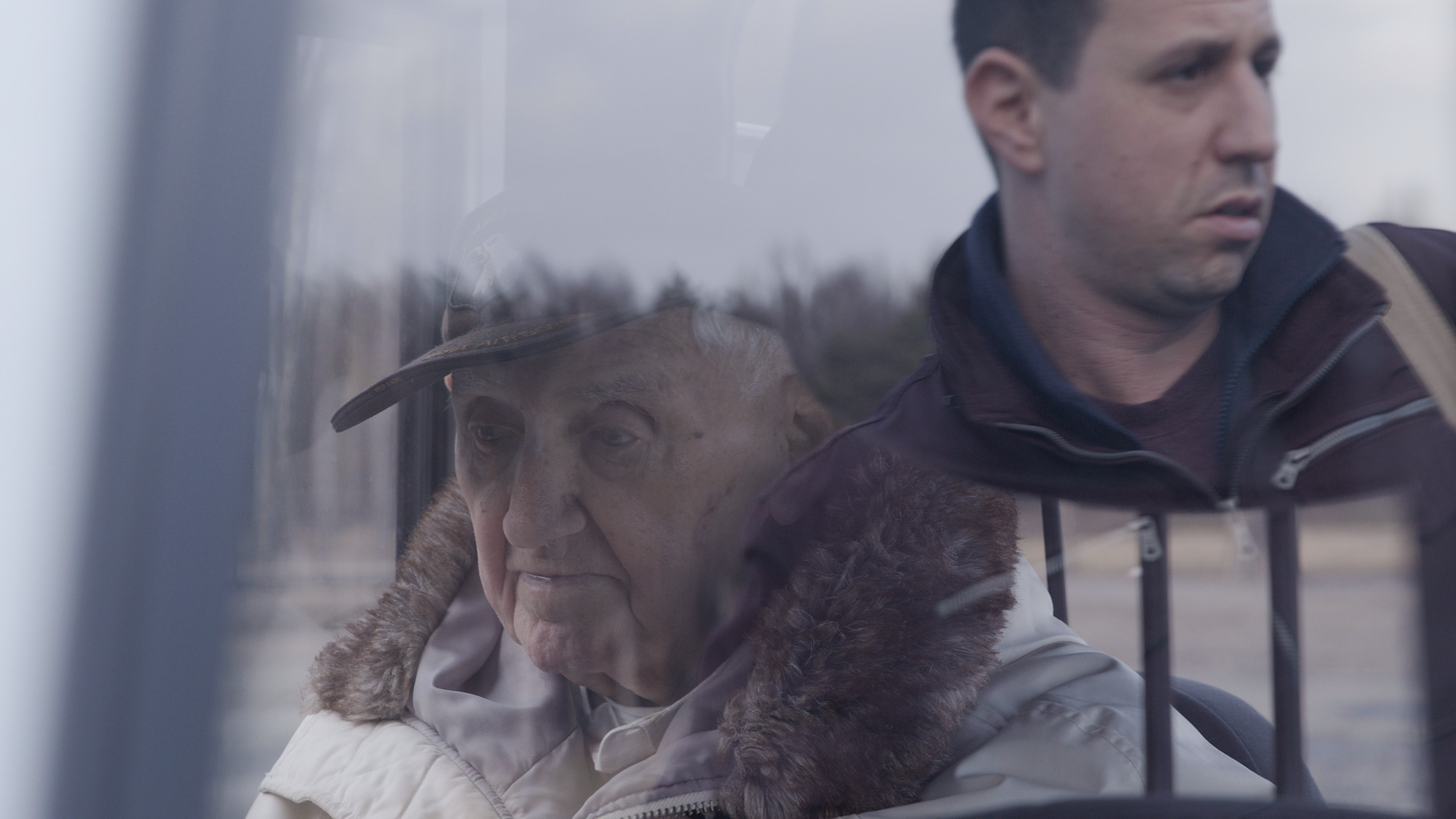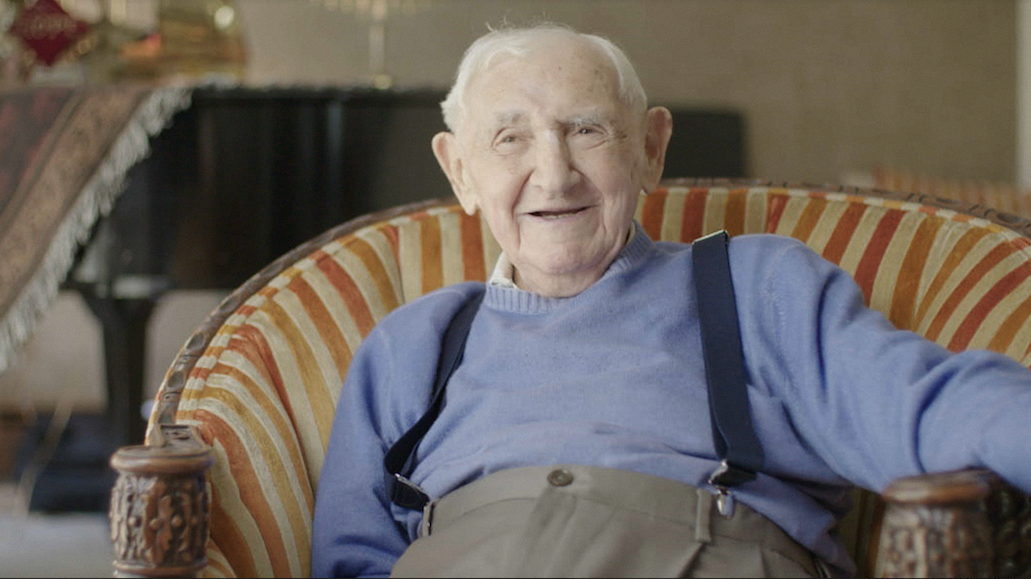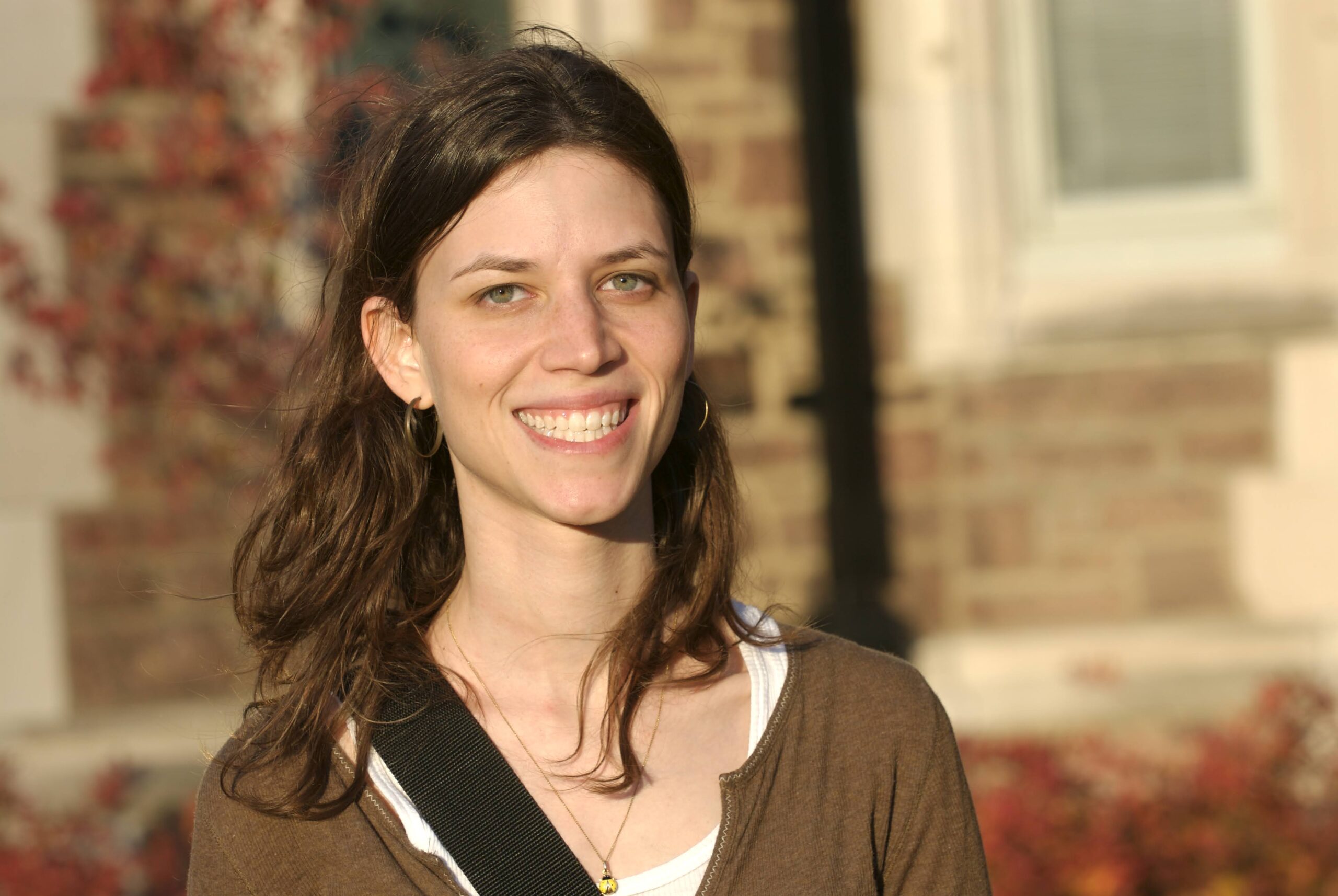It’s hard to imagine the Holocaust and the evil that was perpetrated in the camps in Auschwitz. In all the fear, the horror, the sadness and the darkness – there was music and there was a secret love affair. With the end of the war, the love affair also ended but the journey continued. Sometimes life has a silver lining that is found when you are ready for it. If war can open up hell, then the end of a war can create new beginnings, new hope, new love and new families. How Saba Kept Singing is an extraordinary documentary recounting the years that David Wisnia spent in a prison camp during the Holocaust.
Sara Taksler (The Daily Show with Trevor Noah, Tickling Giants) wrote, directed and produced this magnificent, very personal and extremely revealing film with resolve. It is a first-person history lesson of life in a prison camp, then escaping and joining the American army to destroy the Germans and being inside the bunker moments after Hitler’s suicide. David was fluent in German and was invaluable in negotiating dozens of German soldier’s surrender. When the American soldiers went home, David Wisnia went with them. He had some relatives there and started a new life in The Bronx, with music and singing forever intertwining. His relationship with his grandson Avi Wisnia is especially strong and unbreakable. They perform together with David singing and Avi on the piano and vocals.
When the 70th anniversary of Auschwitz-Birkenau happened, David went back with his grandson and the rest of his family to revisit and try to put the pieces together, to recognize someone and find answers. This film was executive produced by Hillary Rodham Clinton and Chelsea Clinton, produced by Retro Report and Hidden Light Productions, in association with Burnt Umber Prod. The music score is Oscar worthy, the film is Academy Award worthy, but I’m no expert… I’ve just seen thousands of them. This film will take your breath away, it will squeeze your tears out and it will wrench your gut at times. There are so many lessons, history and wisdom immersed, you’ll forget that it’s also a unique and incredibly enduring love story that has no boundaries. A postcard to the family, a love song for romantics, a history story and a legacy all wrapped into 80 mins.
How Saba Kept Singing premiered on April 27 and 28th, which is Yom HaSoah – the Holocaust Remembrance Day. This year, people around the world will honour the 77th anniversary of the liberation of many Nazi occupied concentration camps.
It had its world premiere at this year’s Hot Docs on May 1, 2022 and the film starts with David preparing for his return to Auschwitz-Birkenau for a 70th anniversary. Traveling with his grandson and musical partner, Avi – David reveals some unshared stories about his survival journey. Throughout his lifetime, he selectively shared details about his war experience, mentioning that his gifted singing voice provided him with unique privileges that aided in his survival. However, when recounting his history, he innocently omitted a major detail – a love affair with a fellow prisoner is what actually saved his life. Told through David’s perspective, the truth regarding his survival some 75+ years ago is uncovered and acknowledged.
In lieu of a filmmaker Q&A at the festival’s premiere screening on May 1, the grandson of David Wisnia, Avi Wisnia (who also stars in the film) will be giving a special performance at the screening.
I had the very gracious honour of speaking with the very brilliant and gifted filmmaker, Sara Taksler from her home in New Jersey. Much respect and admiration – roll the tape!
HNMAG “Congratulations on your documentary. Is this your second documentary?”
SARA “This is actually my third feature film. I did a feature with my friend Naomi Greenfield, about balloon twisting conventions – people that made balloon animals. It premiered at SXSW in 2007 and I did Tickling Giants a few years ago.”
HNMAG “This film is about David Wisnia, an accomplished singer and Holocaust survivor that used his singing to help him survive the prison camp. I understand that more news has come to light of a love story between David and another woman in the camp?”
SARA “David, like many Holocaust survivors was reluctant to share the details of his story, with the trepidation of reliving those experiences and feeling like you’re burdening your family with the horrific stories. He waited decades to tell his story, even to his own kids. There’s been some parts omitted because he’s not sure about some of the details and how things worked. There were some stories that don’t make any sense about a journey he goes on to know the complete story himself. He tries to learn so he can share it with his family and that includes the relationship he had with a fellow prisoner.”
HNMAG “Do we find out who that was in the film?”
SARA “In the film we learn about the relationship, we hear from this person and hear her perspective, and what it meant to try and help your fellow prisoners.”
HNMAG “Many of these Holocaust stories seem to have faded from the headlines. I’m glad that you were able to give an old story life and share more details of surviving inside a prison camp.”
SARA “We’re trying to tell it in a way that’s unexpected in a Holocaust documentary. There’s actually a lot of levity in this film. From the very first scene, you laugh and there’s music – the acting defiance is joy! It’s definitely evident in the film.”
HNMAG “When you began your pre-production on the film, did you know what type of story you wanted to tell?”
SARA “I knew the family and I knew how they approached tragedy. I came to know their bravery and how they processed things after one of David’s grandchildren, that I grew up with – passed away. In my experience, the family has always been definitely funny and I knew of his love for music, which made it more appealing and provided a different way to look at this topic, which is very real to me. If you can imagine, the worst place in history – there’s somebody playing a song or humming it in their head, telling a joke to the person next to them to keep them going. I like the idea of approaching this as real people in a real place. I feel like music, jokes and art do those things.”
HNMAG “How were you able to distill the subjects down to David and his story?”
SARA “I knew them growing up and his grandson and his son was my family’s Rabbi. A few years ago, I heard David and his grandson performing a concert together. The details of it blew my mind, it was like a scripted movie and I started calling him the Jewish Forrest Gump because of the situations he found himself in, before getting himself out of them. I was fascinated by him and the first night I heard him speak, I had asked Avi if they’d ever considered making a movie. The ball started rolling from there and it felt like the right time. Holocaust survivors are getting older and if I’m going to tell the story, this is the time to do it.”
HNMAG “I know you’ve got some high profile backing on this film, with Hillary Rodham Clinton and Chelsea Clinton as executive producers. How did that relationship begin?”
SARA “I had been working on another project with their production company and I hit it off with the company, they’ve been great to work with. They had asked what else I was doing, so I’d sent them a copy of Tickling Giants and a rough cut of Saba Kept Singing. Johnny, who’s behind Hidden Light, is a music lover and really appreciated it. He shared the project with other people at Hidden Light and it took off from there. Thankfully, they wanted to get involved and support the film. I’d been making the film with a production company called Retro Report. I’d worked on another show with them, so they’ve really been with me from the very beginning of filming for this project, then Hidden Light joined and now we’re all making it together.”
HNMAG “This sounds like quite an undertaking. How long did it take to get this project off the ground?”
SARA “On the one hand, decades because I met them when I was a kid. In reality it was 3 – 4 years ago that I started talking to them about the idea. Someone that I know was writing a book about immigration stories and she was going to be writing for the Times, so I thought it would be a good idea to draw up some attention to get it made. They wrote an article on it and the story went viral. We went to Poland in January of 2020, just before Covid started. It was the last in person filming we could do because after we returned, everything went into lockdown. The edit occurred virtually.”
HNMAG “Where does this story start in the film, is it from the beginning?”
SARA “We start with Avi and David in an intimate funny moment. They tell the audience that they have a very tender relationship and they make each other laugh. There’s a lot of warmth in that scene and from there David opens up and shares that he has a history of singing for the Nazis, that music saved his life and that he is a lover of life. We go into the story knowing that and how important music was to him… but then quickly come to find that there are still questions in the story that David doesn’t know the answer to. Even as he’s telling his family, there’s certain things that he doesn’t know. He can’t share his entire story and he’s looking for closure.”
HNMAG “What size of a crew would you have used to capture all the footage?”
SARA “We would use 2 – 3 cameras, depending on what we’re shooting and a sound person. It was small but I prefer intimate crews and fly on the wall stuff and not waiting around for a setup. In the moment I believe you can lose a lot, so I prefer to have the cameras rolling. A more intimate crew allows you to do that.”
HNMAG “Was there some topics or subjects that were off limits and you couldn’t talk about it in the film?”
SARA “With every story, there’s a million ways to tell it but there was nothing that I couldn’t potentially go into with this film.”
HNMAG “How old was David when these events happened?”
SARA “He started singing when he was a kid and was in a choir that did performances. When he sang in the camp’s he was a teenager but as an adult, he became a cantor later in life and would sing at synagogues during services.”
HNMAG “How big did David’s singing career get?”
SARA “Later in life he would do concerts and he and Avi would perform together for hundreds of people at a time in auditoriums and synagogues. They also travelled around the US and Poland.”
HNMAG “What was the genesis of the idea for making the film?”
SARA “I was curious where entertainment and survival intersected. Although the circumstances are incredibly different, making this documentary during Covid and a dark time, it felt instructive. No matter what a human being is dealing with, they can always turn to music, human interaction and art as ways to cope, to get up and keep going. Seeking that out, wherever you can find it even in hard times, is a beautiful thing. On a grander scale, David has lived through the worst injustice imaginable and really horrifying times. As we ourselves live through some of those horrors in other parts of the world and at home, remembering what role we have in that, actively or passively and not looking the other way, because we can do better.”
HNMAG “Do you also have a special relationship with music yourself?”
SARA “Music is my way of personally processing the world. Jokes are my way of interacting with other people but music is my own way of dealing with my own thoughts. I play guitar and harmonica poorly and I dabble on the piano but for me it’s very soothing and I started writing songs twenty years ago for myself. I love live music and think it’s the best thing you can do outside of your house (laughing), going to hear someone perform live; it really gives me life, combined with my love for dancing. David says that music is life. My grandmother used to say that after she dies, we should put a radio in the coffin and if she doesn’t start dancing, then we would know it was real. Growing up, my dad loved music and it’s been very central to my life. I’ve always found music to be very healing.”
Sara informed me that she’s mastered a twenty second intro to a blues song on her harmonica, which is further than I’ve come on mine. Music can certainly heal and accompany us in our darkest times.
HNMAG “This film, How Saba Kept Singing premiered at Hot Docs?”
SARA “Yes, it premiered on Sunday (May 1) and will have another screening today and Sunday. This is the world premiere.”
HNMAG “Where does the film go after Hot Docs?”
SARA “We are starting to look for distribution. We’ve been lucky enough to get some calls and hopefully it’ll start to move and we’re also doing other festivals as well as figuring out where to do the US debut. I’m hoping that people will be able to stream it wherever they live, very soon.”
HNMAG “I think this film will appeal to an audience for the music, as well as the Holocaust element. Are there other elements in the film you were hoping to convey in the film?”
SARA “I think the biggest compliment we’ve had with this movie, has been people saying that it makes them want to call their grandparents. As someone that was very close to their grandparents, my last living grandmother passed away while I was making the film and my editor Jackie also lost her grandmother while making the film. This is a family story in many ways and it’s about love, not necessarily the romantic kind – although there is a relationship in the story. It’s much more about family love and it’s a family story and people that have grandparents that make them laugh will very much be able to identify with this story.”
There is some incredible animation that helps to fill in parts of the story and add a missing link/element of a picture that’s worth much more than a thousand words. Expect to see this film everywhere soon because this story needs to be told and society can be better for it.
How Saba Kept Singing is also available to stream across Canada through the virtual Hot Docs screening option offered this year.




